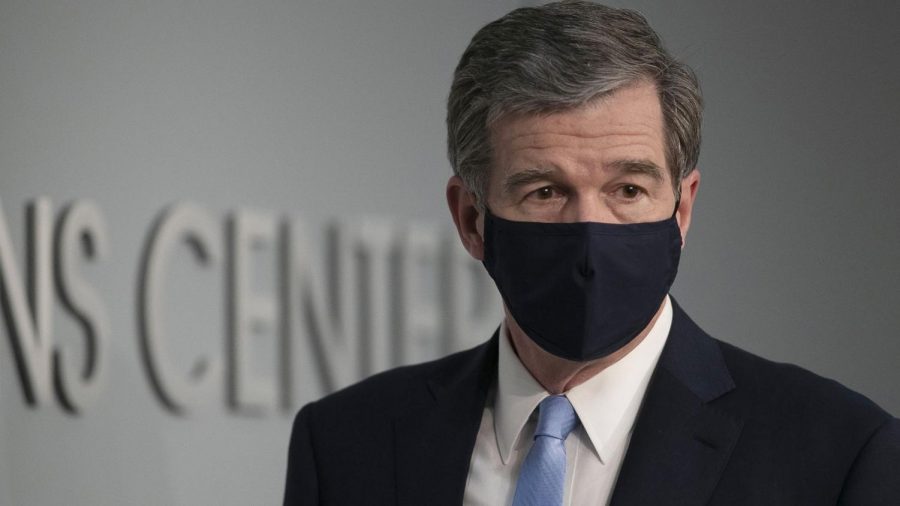Cooper announces final eligibility date for COVID-19 vaccines, promises eased restrictions in coming weeks
Courtesy of the North Carolina Department of Public Safety
Gov. Roy Cooper dons a face mask at a press briefing.
March 17, 2021
Gov. Roy Cooper announced in a press conference Wednesday all adult North Carolina residents will be eligible to receive the vaccine by May 1 regardless of, status or condition.
Cooper also updated Group 4 eligibility, certain members of Group 4 will be eligible to receive the COVID-19 vaccine beginning March 17.
The new eligibility applies to people with medical conditions that put them at higher risk for severe health complications from contracting the virus and people living in congregate settings such jails or homeless shelters.
“We still need to wear our masks and take this seriously,” Cooper said.
The remainder of Group 4, including students living in dorms, will be eligible to receive the vaccine on April 7, Cooper said.
According to the North Carolina Department of Health and Human Services, 25.7% of North Carolina residents over the age of 18 have received one dose of the vaccine and 16.5% of adult residents are fully vaccinated.
Cooper said he plans to ease restrictions further with his next executive order on March 26.
Cooper said the state’s COVID-19 numbers have remained “relatively stable” in recent weeks and he is “very hopeful” that North Carolina can continue to reduce restrictions.
As of March 17, North Carolina had 889,310 cases, 1,999 new cases, 1,002 hospitalizations and 11,757 deaths from COVID-19, according to the North Carolina Department of Health and Human Services.
Despite positive upward trends in vaccinations and downward trends in the number of hospitalizations Mandy Cohen, secretary of the North Carolina Department of Health and Human services, warned of new COVID-19 variants.
“We need to keep our guard up,” Cohen said.
Cooper said he wants to focus on “equity” with vaccine distribution.
According to the North Carolina Department of Health and Human Services, 23.1% of Black residents, 9.8% of Hispanic residents and 71.7% of white residents have been vaccinated.
Cohen said vaccine supplies have steadily increased. She said she expects more doses of the Johnson & Johnson vaccine to arrive in North Carolina in April and further increase the state’s weekly vaccine supply.
Cooper urged North Carolina residents to remain vigilant and continue wearing masks even after receiving the vaccine.
“Let’s keep up the faith and keep up our masks and know that if we do these things together, we will get through this,” Cooper said.











